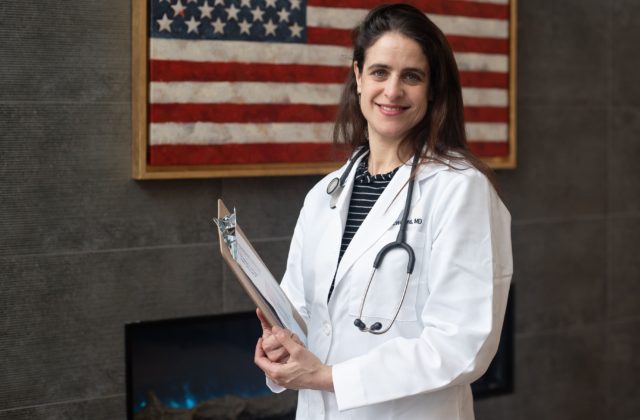The Opposite of Addiction is Connection – Peer Support in Recovery
February is here, and to many it’s viewed as the month of love, togetherness and a celebration of relationships. But for a person suffering from a substance use disorder, this month may be just another reminder of the loneliness, isolation and separation that addiction creates.
“But there is hope,” according to local addiction treatment provider Recovery Centers of America.
Addiction treatment works, and recovery is possible. Through the recovery process, individuals with a substance use disorder break away from the isolation of addiction and reconnect with themselves, family, friends and society. Plus, developing new, supportive and meaningful relationships is likely. In fact, building a peer support network is a critical component of building a foundation to support long term recovery from addiction.
As defined by the Substance Abuse and Mental Health Services Administration (SAMHSA), peer support “encompasses a range of activities and interactions between people who have shared similar experiences of being diagnosed with mental health conditions.” This sense of mutuality promotes connection, a sense of belonging, and hope.
According to SAMHSA, research proves that peer support is effective in promoting lasting recovery from behavioral health conditions. Through peer support, individuals in addiction treatment and recovery experience:
- Increased self-esteem and confidence
- Sense of control and ability to bring about life change
- Feelings of empowerment, hope and inspiration
- Empathy, acceptance and camaraderie
- Increase engagement in self-care and wellness
- Increased social support and social functioning
- Decreased depression
Building Camaraderie through Specialized Addiction Treatment Programs
The first step to building a peer network to support you on your recovery journey is to become immersed in an environment that fosters connection between individuals who understand what it’s like to have the disease of addiction, and who strive to recover and grow together.

At Recovery Centers of America, with local facilities in Devon, PA and Mays Landing, NJ, patients build a peer support network throughout the full continuum of care—inclusive of detoxification services, residential inpatient treatment, outpatient treatment (offered both in-person and via teletherapy), medication-assisted treatment, and an active alumni association.
As a patient at RCA, you can expect to receive the highest quality care from masters-level clinicians through specialized programs that are hyper-focused on fostering connection and support with peers. Through our treatment programs, patients recover together, immersed in a close-knit community and focused environment that promotes connection. The following is a list of the residential inpatient programs offered at RCA at Devon (Devon, PA) and RCA at Lighthouse (Mays Landing, NJ).
Young Adults Program: For young adult men and women
Young adults entering treatment for drug and alcohol addiction have unique needs. As a member of RCA’s Young Adults Program, designed for adults roughly 18- to 34-years-old, you will receive custom-tailored addiction treatment while recovering in a focused, gender-segmented community that fosters connection and support. Treatment methods include cognitive-behavioral therapy, motivational enhancement therapy and twelve-step facilitation therapy.
Evolutions Program: For older adults
Treatment for older adults, roughly 50-years-old and older, often requires more intensive medical support, as withdrawal is typically more difficult and dangerous. Additional care is taken by the team at RCA to lessen the stress that social and psychological withdrawal, as well as behavior modification, places on these patients. To ensure the highest level of comfort, patients reside and attend therapy with other members of this age population.

PRISE Program: For patients who have relapsed
Confidence and dignity are restored to individuals with a history of relapse by an approach founded on integrated, evidence-based behavioral health and medication-assisted therapies, including acceptance therapy, narrative therapy and positive psychology. What’s crucial to patients returning to treatment after a relapse is being comfortable where they live and developing a new community of recovery. RCA helps patients learn to replace harmful people, places and things with positive people, places and things right where they live today.
Breaking Free Program: For patients with trauma
About 75% of people struggling with addiction have also faced trauma. RCA’s trauma-informed program treats the whole individual by treating both the disease of addiction and underlying trauma via cognitive behavioral therapy and here-and-now therapy. This program is not just about addressing trauma—it’s about understanding and learning to cope with emotions, behaviors, reactions and past experiences.
First Responders Program: For first responders and military
Whether you’re an active or former law enforcement officer, firefighter, correctional officer, paramedic, or military veteran––RCA can help you navigate recovery from addiction in a safe, confidential, peer-supported environment. The program addresses work-related traumatic events, guilt, acute/chronic pain from line-of-duty injuries, guilt, depression, anxiety and more. With your permission, RCA works with your union, department and/or employee assistance program.
Christian Faith-Based Program: For faith-based treatment
Addiction drains an individual physically, mentally and spiritually. Whether you already stand strong in your faith, want to explore spirituality/religion further, or just feel as though you’ve lost touch with your faith, RCA will meet you where you are with encouragement and compassion. Offered exclusively at RCA at Lighthouse in Mays Landing, this program is supported by multiple pastors who work for the center.
Join the RCA Recovery Community – Everyone is Welcome
Once you are a patient at RCA, you will always be a part of the family and have a built-in support network through an active alumni association. The alumni association hosts many events that are open to anyone in the recovery community—and friends of recovering people. Everyone is welcome.
In February, the RCA alumni association invites you to a virtual concert, virtual Valentine’s Trivia and phenomenal motivational speakers Kirsten Johnson and Scott Hunter. Learn more on the RCA website.
“The opposite of addiction isn’t sobriety. It’s connection…” wrote author Johann Hari in his New York Times best-seller ‘Chasing the Scream: The First and Last Days of the War on Drugs.’ “If you are alone, you cannot escape addiction. If you are loved, you have a chance.”
The team at Recovery Centers of America is standing by. RCA admits patients 24/7 365 days a year and will go the extra mile to get you or your loved one into treatment today. Call now: 866-276-6174.




